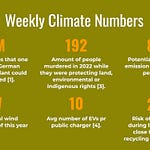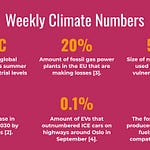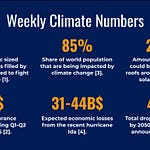Welcome to this weeks edition of The Weekly Climate 🎉
References: [1], [2], [3] and [4]
A quick announcement before we go on to the newsletter. I wanna take this time to welcome our first Voluntary Researcher, Knut Eirik Almelid. I met Knut at a virtual Danish Refugee Council event earlier this year and we had a couple of chats after that about The Weekly Climate. So when I heard he had started looking for a new gig (which he still is) it was obvious to ask if he wanted to help with the time has. Knut has worked with Doctors Without Borders in the Middle East and Eastern Africa, as well as in Oslo and Copenhagen. Together with an academic background in middle eastern studies and political science, he sees climate change as the single most important issue of our time. He's an avid listener of the Weekly Climate 🤗 and looks forward to contributing with his climate crisis nerdiness.
So what does a newsletter need Researchers for you may ask?
We have many plans and one of them is to start launching bigger projects every now and then. And Knut is helping out with the first one. Which we can’t wait to tell you more about in a few weeks! 😎
‼️News you can’t miss
Here’s one important scary/bad (🙀), good (😻), interesting (😼) and fossil (💩) news item.
🙀 Updated numbers suggest that fossil fuel based pollution kills 8.7 million (up from 7.5M) every year.
😻 Surprisingly, a NASA-based study has shown that economic growth in Africa is not followed by a corresponding increase in emissions.
😼 A detailed look at what the average consumer can do with the pension plan to help solve the climate crisis.
💩 Shell has joined the peak oil gang and has come with a rather unimpressive plan for how to get to net-zero.
👩⚕️ Status: Climate & Science
Let’s look at how we’re doing this week!
[#holes] — Three additional Siberian “methane craters” have been found. These giant holes are left when methane under high pressure escapes due to the thawing permafrost. And for the record methane is 28x more potent greenhouse gas than CO2.
[#pollen] — If you suffer from hayfever here’s another one just for you. Climate change is worsening the pollen season. A new study shows that in the US the pollen season now on average starts 20 days earlier and last 8 days longer than in 1980.
[#india] — Last week I wrote about a glacial lake in Peru that expanded 34x the past 30 years due to glacier melt. What I missed late Sunday last week was that a flash flood in Uttarakhand in the Himalays in India coming from glacial lake actually happened. The flood killed dozens of people and left hundreds missing. This article in the New York Times looks at this phenomenon which is bound to happen a lot more with climate change. See the horrifying images of the flood here and this article dives deep into what actually happened as well as what’s too blame (with more videos and details from the incident).
[#globalwarming] — The global average temperature for January was 0.24C higher than the mean during past 3 decades. As expected it was warmer, but not as extreme as other months recently.
📰 The 7 Grand Challenges
⚡️Decarbonize Electricity
Clean electricity is the one do-or-die challenge we must solve.
[#wind] — A few months ago GE made headlines with the largest wind turbine in the world which can output 13MW. Now Vestas beat it with a 15MW one.
[#rooftop] — Utilities have long argued that rooftop solar would cause electricity costs for non-solar owning customers to increase. But a new US-based study has shown that the opposite is true. In fact if you live in a US community (I don’t know how this converts to other parts of the world) and own solar panels, your solar panels are making electricity cheaper for your neighbors 😎.
[#virtualpowerplants] — I for one is really psyched about virtual power plants (VPPs). This article dives into the technology and how it can help the UK meet its net zero targets.
🏘 Reduce impact of urban and rural areas
Lowering the impact of urban and rural areas.
[#furniture] — IKEA is a big polluter and here’s how it plan to change that, by making it’s cheap furniture last forever. And being conscious about how it gets its trees.
[#truecrime] — The energy transition will bring batteries. Lots of batteries. And this has caused the price of minerals used in battery production to go up. Rhodium for instance has 640$ for 30g to 21.500$ for 30g. This has caused an uptick in thefts of a specific ICE car component called a catalytic converter which contains Rhodium.
[#ev] — We have trickled various EV market reports in the past weeks newsletter, but this time Inside Climate News sums it all up. Norway is far far ahead than anybody else with 56% of new vehicles being sold is an EV. This articles dives into what have caused Norways success here.
🛁 Clean non-electrifiable activities
Some activities we do today can’t be electrified, these must be cleaned some other way.
[#f-gases] — In 2018 scientists detected a steady increase in atmospheric concentrations of the extremely potent greenhouse gas CFC-11. Before the Montreal protocol, CFC-11 was used in foam insulation, but was banned under the Montreal protocol and had been under a steady decline until 2018. Scientists managed to track the chemicals to illegal production facilities in East China and got the facilities shutdown. CFC-11 is 7000x more potent than CO2 as a greenhouse gas.
[#heat] — A demonstration facility of producing green hydrogen to produce heat for cement production is being opened in Swansea, UK. It’s important to note that the carbon emissions from producing cement this way is far from curbed as there are many other sources of carbon emissions in the cement production.
🌳 Protect and grow nature
Nature is our ally, we must protect it and help it help us.
[#planttrees] — This is so cool. Wow. Cleantechnica tells the story of a retired school teacher who bought land in Oregon and now has planted 10.000 trees on that land. Hereby helping very actively with creating more natural carbon sinks. Anybody want to join let me know. We can start a small Weekly Climate community tree planting project, that would be so cool! 🌱
[#burntrees] — And to the opposite of planting trees: Burning them on purpose. 7B$ are spent in the EU on subsidies to burn trees for energy. And all that tree is in many cases shipped from the rainforest in South America on polluting ships and then burned. It seems insane to keep on this practice, which this article also suggest. The article also looks into what the problem is and what’s stopping us from ending this practice.
[#landprotection] — Here’s an interesting ground zero story about the fight to protect land in Canada from an open pit coal mine after rules protecting the land was rescinded last year.
🍽 Optimize food
Without the lower impact of food or drink the hero doesn’t work (modified old danish proverb).
[#book] — Mark Bittman who’s mostly known for developing more than 30.000 recipes and writing more than 30 recipe books has a released a new book in which he dives into reimagining the food industry centered around people and planet instead of profit. It sounds interesting and definitely made my reading list.
[#eu] — New rules in the EU bans vegan “dairy” product companies from using terms like “yoghurt” and “milk” in their product names. It’s really a case of David vs Goliath, with David being the small up-and-coming vegan food lobby and Goliath being the big and bad traditional agriculture lobby.
⚖️ Climate Justice
Without justice there’s no future.
[#airpollution] — A NASA study looked into nitrous oxide emissions in Africa as the economies have grown and to the surprise of everyone found that nitrous oxide based air pollution have dropped. It usually goes the other way.
[#geothermal] — A look at how geothermal energy development could pave the way for Peru to economically develop. Peru both have big mining resources as well as good places for geothermal facilities. Same is true for Indonesia where it already is generating 600M$ additional revenue than expected (total 1.9B$).
[#indiansolar] — IEA published a new report about India’s energy future and it looks as if India is just on the brink of a solar revolution.
⬇️ Engineered drawdown and geoengineering
Protecting our planet and species one way or another
The article below actually caused me to realize that I was missing geoengineering from my overview, so I decided to rename Drawdown to “Engineered drawdown and geoengineering”. Technically, removing CO2 from the atmosphere is a form of geoengineering, but I’m keeping the word in here to avoid confusion. Personally, I’m not a fan of geoengineering but I think it’s an important piece to keep track on as well.
[#geoengineering] — A Harvard based experiment in solar radiation management is about to go live, which will spray sulfur dioxide into the atmosphere and using that cool the surface of the Earth. Swedish activists are opposing the experiment which are supposed to start in June 2021. In this article Ezra Klein from Vox discusses the question of whether we should dim the sun or not.
📦 Other / catch-all
All the other stuff that I couldn’t fit into any of the other categories, than the other category.
[#pension] — A point that is too rarely stressed in my mind is how much power the average consumer has to control the future via their retirement plan. There are extremely few pension funds today that have a green portfolio option and if they do, then they also manage a fossil fuel one as well. And that defeats the purpose of having the green one to begin with. It’s why I actually decided to manage my own pension, simply because there’s no other way in Denmark to get a fossil fuel clean one. This article talks about the arguments and (from a US standpoint but it’s probably similar in many countries) what to do.
[#wolverines] — Here’s a fascinating look at the wolverines living in the Arctic and how it needs to adapt to climate change.
[#book] — Bill Gates is releasing a new book titled “How we can avoid a climate disaster” and in this article he talks about it. He has received some flak for being yet another well-meaning billionaire and here he also talks quite frankly about that.
[#maladaptation] — CarbonBrief introduces the concept of “maladaptation” which happens when otherwise good intentioned climate adaptation efforts ends up backfiring. The study cites a case in Sao Tome and Principe in which climate adaptation aid was offered in the form of agricultural modernisation, but only to people who already owned land. Hence the “landless” who was already vulnerable now became even more so.
⭐️Special Topics
🎩 Global and local policy
We have a special interest in covering the major global and local policies regarding climate, whether good or bad.
[#wildfire] — California plans on spending 11B$ on wildfire prevention in 2021 and 2022. Main activities will be repairing equipment, trimming vegetation and other risk mitigation measures.
[#conservation] — President Biden wants to create a Civil Climate Corps Initiative which aims to give the unemployed work as helping climate solutions. Why focus on conservation though? Why stop there?
⛽️Major Carbon Emitters
We have a special interest in covering the moving of the major carbon emitters as these are the key roadblock to climate action.
[#death] — Remember when I said earlier that different types of air pollution kills 7.5M every year? Well. A team of researchers has now determined that the death toll from the fossil fuel portion alone (from fine particulate matter) is 8.7M 😳. Every. Year (data from 2018). That’s roughly 18% of global premature deaths in 2018.
[#shell] — The biggest news item last week was probably that Shell announced it has reached peak oil production 2019. From here on, like BP, it will transition into an energy company. So far the right words were said. But what about implementation. As this post dives into, a lot of details a lacking. First of all, Shell commits 8B$ every year to the continued production of fossil fuels, compared to roughly 2B$ committed to renewable energy. It also wanna invest in carbon capture and storage and perhaps most ridiculously allow it’s natural gas customers to offset their emissions via tree planting. There’s nothing wrong with tree planting, but thinking you can burn natural gas and make it carbon neutral by tree planting is just lying to yourself. So while Shell is being more transparent about its changes than other oil majors, it’s not enough. And many people speculate whether Shell can afford this plan while keeping shareholders happy. But you know what, fuck the shareholders. If you’re stupid enough to buy stocks in a dying industry you brought it on yourself.
[#wind] — BP just won a bid to build two giant windfarms close to Ireland. If this was Ørsted or similar companies then this would raise no eyebrows. But what’s interesting about this is first of all that it’s BP (which is a good sign) but secondly that BP paid more than 15x more than the closest bidder. What does this mean? That electricity prices from the site will be much higher hence worse for the industry and worse for consumers. So is this good or not? I must admit I don’t know. It sure is weird.
[#gasstoves] — If you’ve been reading this newsletter for some months now you know that I have a pet peeve with gas stoves. Not only does it increase your risk of getting asthma due to the amounts of pollutants released when burning fossil gas inside your home, but the fact that fossil fuel industry engineered a propaganda campaign to “cook with gas” is just as appalling. Now new cases are popping up about how fossil fuel hired PR companies are spreading propaganda about gas stoves. Read the full story here. It’s disgusting.
[#bigoil] — Related to the story about Shell this week, New York Times compares US and EU oil giants on how they act regarding climate change. And the differences are quite staggering: BP and Shell all say some stuff that indicates a desire to change where as Exxon and Chevron are both just “full steam ahead! Let’s burn the world to the ground”.
[#jobs] — A few newsletters back I highlighted a story about how young people who so badly want to go into the fossil fuel industry really has to consider their options because of COVID (ahem DYAC “climate change”). This story shows the opposite side. Engineers who used to work in the oil sector but now want out to stop making the world worse. Was it picked up by NYT? Not yet at least. Weird. They should represent both views I think.
[#bigoil] — Putting Shells promises into perspective, state-owned fossil fuel firms are planning to invest 1.9T$ (that’s 1.900.000.000.000$) in the next decade on burning fossil fuels which will destroy all hopes of reaching the Paris climate targets. Now should we decide to reach the Paris targets there’s a big risk that about 400B$ of those will be so called stranded assets. The report puts it bluntly: Either the world decides to stop burning fossil fuels or the companies get’s to have a financial party. It has to be one of them.
That’s it for this week folks! Remember if you’re feeling down, angry or sad from some of the news in this newsletter one cure is to act. And one way you can always act that also happens to be one of the most powerful things you can do is to talk about it. That also works if what you just read made you hopeful or happy btw.
If you enjoyed this newsletter don’t forget to share it with your friends, coworkers or other people you think could benefit from getting it. If you got directed here by a friend or another link on the Internet don’t forget to subscribe!
See you all next week 👋












